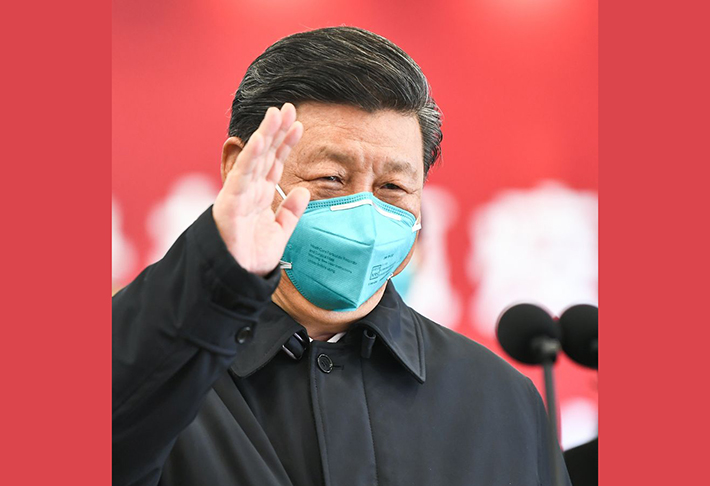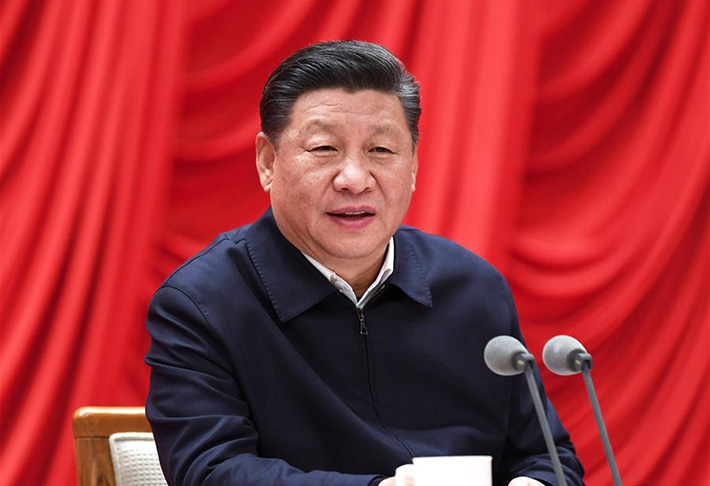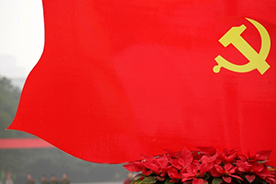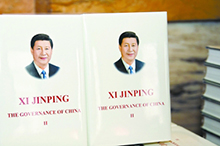-
32f22da2-0251-40a9-a316-8c8d96c7a6eb.jpg)
October 26, 2020
New book explains philosophy behind China's development miracle
When reading Xi Jinping: The Governance of China Volume III, one needs to bear in mind two important factors: One is China's national rejuvenation, and the other is the world experiencing a level of change unseen in a century.
-
697347c9-00dd-4899-8112-e2a95387147f.jpg)
September 24, 2020
China's commitments at UN advance global cooperation, boost confidence
Experts spoke highly of the proposals put forward by President Xi on global anti-pandemic cooperation and the role of the United Nations in the international system.
-
September 23, 2020
Xi's UN speech shows 'clearly focused vision,' says expert
Chinese President Xi Jinping has presented to the world his country's "clearly focused vision" of international relations, said a renowned U.S. expert on China.
-
1d825672-1a5c-4791-928e-ad01179698e6.jpeg)
September 14, 2020
Xi's speech sets course to put focus on science
Scientists said President Xi Jinping's speech on China's scientific development on Friday was deeply insightful, inspiring, and instructive.
-
55292a61-9918-4df9-80e4-0ebec553fb80.jpg)
September 10, 2020
Xi's speech at meeting commending COVID-19 fight role models inspiring
Chinese President Xi Jinping's speech at a meeting to commend role models in China's fight against COVID-19 has inspired and encouraged some Chinese people working overseas.
-
July 31, 2020
New volume of Xi's book provides lessons on wise governance, says expert
The recently published third volume of "Xi Jinping: The Governance of China" provides lessons on wise governance and a better understanding of the principles and developments of the Communist Party of China (CPC) under Xi's leadership, said one expert.
-

March 12, 2020
Xi's Wuhan trip boosts confidence in fight against COVID-19, overseas experts say
Chinese President Xi Jinping's inspection trip to Wuhan on Tuesday has demonstrated his care for people's health and safety and assured the world of China's confidence in the final victory over the novel coronavirus, international experts and scholars have said.
-
e11ab7e6-90f8-4dc7-aae9-ba5a8c25b704.jpg)
July 23, 2019
China's governance experience worth learning: Myanmar political analyst
Overcoming domestic and international challenges in its development, China has made great achievements and its state governance experience is worth learning, a senior Myanmar political analyst has said.
-
54e4cad7-7a68-4659-8dd4-efaffa2c229f.jpg)
May 17, 2019
Xi's vision on civilizations inspires hope for humanity's future
Chinese President Xi Jinping's speech at the opening of the Conference on Dialogue of Asian Civilizations on Wednesday has been echoed by many as his vision inspires hope for a brighter future for Asia and humanity.
-
May 15, 2019
Xi Jinping -- champion of dialogue of civilizations
Xi has long been a believer in, advocate of, model for and contributor to communications across civilizations.
-

January 23, 2019
Xi's speech demonstrates CPC's readiness to confront potential challenges
When addressing the opening ceremony of a study session at the Party School of the CPC Central Committee attended by senior provincial and ministerial officials, General Secretary Xi Jinping analyzed the national security situation and touched on major risks in politics, ideology, economy, science and technology, society, the external environment and Party building.
-

October 23, 2018
The three dimensions of Chinese governance
What does the governance of China mean to the world? The CPC's ideas and practices have increasingly attracted attention and triggered plenty of thought in the international community.
-

August 8, 2018
Xi Jinping presents the science of statecraft
Xi Jinping's "The Governance of China" is a work important for people to understand China's current role in global affairs.
-
June 26, 2018
Xi's thought on diplomacy offers wisdom for shared future
A blueprint for China's diplomacy, outlined at a high-level meeting last week, highlighted the drive to realize national rejuvenation and to promote human progress.
-
June 25, 2018
Overseas experts laud Xi's speech on China's foreign policy
International scholars praised Chinese President Xi Jinping's speech at a two-day conference on China's foreign affairs, which elaborated on various topics, including China's vision to build a community with a shared future for mankind.
-

April 12, 2018
Book lauded for its clear vision of a better future
Here, a dozen politicians, researchers, and industry insiders offer their views on the second volume of "Xi Jinping: The Governance of China."
-

March 22, 2018
China's ecological civilization inspires other countries
Erik Solheim, executive director of UN Environment, noted that the concept of ecological civilization is not just something for China, but a model that can influence and inspire the rest of the world.
-

March 22, 2018
IFAD: World to benefit from China's experience in eradicating poverty
Matteo Marchisio, the first country director and IFAD representative in China and Mongolia, believed that China's determination to eliminate poverty is an example for the rest of the world.
-
February 24, 2018
Xi Jinping's new book: An essential primer for understanding China
For anyone aiming to seriously study China's present and future policies, the second volume of Xi Jinping's The Governance of China, together with its companion earlier volume, is by far the best place to start.
-
November 15, 2017
Xi's book to help understand China's development: Azerbaijani scholar
The book containing a selection of Chinese President Xi Jinping's speeches and interviews on governance gives the world community an opportunity to learn about China, an Azerbaijani expert said Tuesday.
-
October 18, 2017
EU experts on Xi's contribution to global governance
China watchers take note of the country's increasingly active international presence.
-
September 27, 2017
Chinese experience included in President Xi's book worth learning: Cambodian readers
The Cambodian version of the book "Xi Jinping: The Governance of China" has won popularity among Cambodian political, academic circles as well as readers since the book was launched in the country in mid-April.
-

September 5, 2017
Expert weighs in on China's governance
Robert Lawrence Kuhn, chairman of the Kuhn Foundation, shared his views in an interview concerning how to understand China's governance as well as how it can contribute to global governance.
-

September 4, 2017
International experts applaud Xi's governance
Experts from the BRICS countries speak highly of the ideas and practice of governance by Chinese President Xi Jinping, and give thumbs up to the "people first" principle immersed in his governance model as well as his suggestions on governance across the globe.
-

August 31, 2017
Huang Youyi: BRICS influence beyond five countries
Huang Youyi, a member of the Chinese People's Political Consultative Conference (CPPCC) and executive vice president of the Translators Association of China, responded to questions from China SCIO on the sidelines of the two-day BRICS seminar on governance on Aug. 17.
-
May 14, 2017
Uzbek president writes foreword for Uzbek version of Xi's book
The Uzbek version of "Xi Jinping: The Governance of China" has been jointly published by China's Foreign Languages Press and the Press of Uzbekistan. Uzbek President Shavkat Mirziyoyev, now attending the Belt and Road Forum for International Cooperation in Beijing, wrote a foreword for the book.
-
April 25, 2017
Summary on Book on the Governance of China by President Xi Jinping
The book, the Governance of China, by President Xi Jinping is a collection of his major work and wisdom on experiences, policies and perspective of the entire Communist Party's leadership.
-
April 25, 2017
What's New in China's Diplomacy? -- Interpretations of Xi Jinping: The Governance of China
This is the first international seminar on the work of a Chinese leader since the book was released in foreign languages last September.
-
April 25, 2017
The Governance Of China states philosophy and polices of new central leadership
The book of The Governance Of China stated comprehensively the philosophy and polices of the new central leadership with Xi Jinping at the core.
-
April 25, 2017
Xi Jinping: The Governance of China book review
I visited China for the first time in 1975. Since then, great changes have taken place in China's governance and diplomacy.

